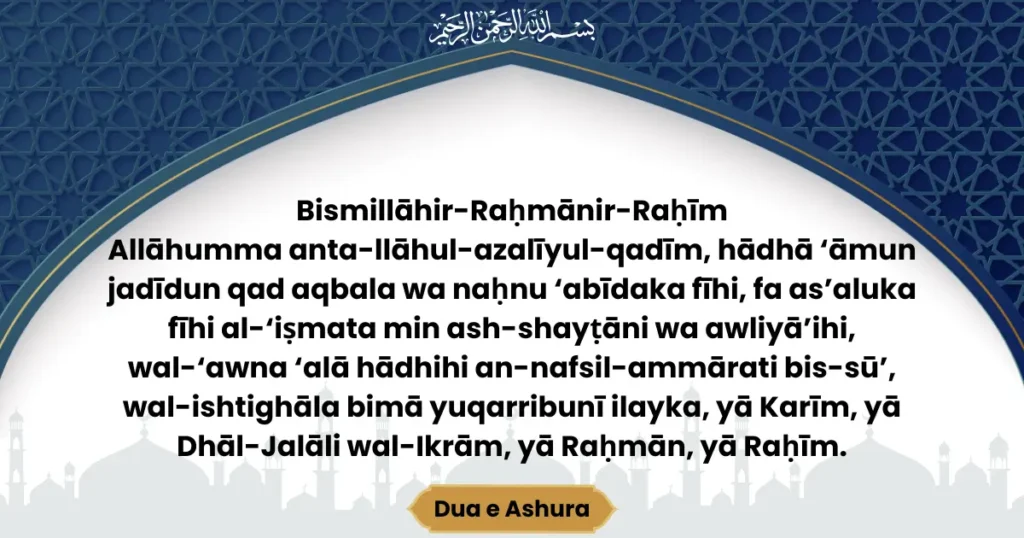
Dua e Ashura: Significance, Virtues, and the Complete Recitation
رہنمائی فہرست Guidance Index
Ashura holds a special place in the hearts of Muslims worldwide. Observed on the 10th of Muharram, the first month in the Islamic lunar calendar, this day is steeped in profound spiritual meaning and rich historical significance. From the salvation of Prophet Musa (عليه السلام) to the tragic events of Karbala, Ashura reminds us of faith, sacrifice, and steadfastness on the path of truth. One way to harness the blessings of this sacred day is through the recitation of Dua e Ashura. In this article, we will explore the importance of Ashura in Islam, delve into the virtues and benefits of Dua e Ashura, and provide the complete supplication along with its transliteration, translation, and explanation. We will also discuss how and when to recite the dua and recommend additional acts of worship to enrich your observance of Ashura.
1. Introduction: Understanding the Importance of Ashura in Islam
Ashura falls on the 10th of Muharram and is revered by Muslims for multiple reasons:
- Salvation of Prophet Musa (عليه السلام): It is widely reported in hadith literature that Allah saved Prophet Musa (عليه السلام) and the Children of Israel from Pharaoh on this day. Prophet Muhammad (صلى الله عليه وسلم) encouraged fasting on Ashura to express gratitude for Allah’s favor upon His prophet.
- Reference: Sahih al-Bukhari (2004), Sahih Muslim (1130).
- Event of Karbala: Ashura is also deeply connected to the tragedy of Karbala in 680 CE, during which Imam Hussain (رضي الله عنه), the grandson of Prophet Muhammad (صلى الله عليه وسلم), and his companions were martyred. This event symbolizes the ultimate sacrifice for the sake of truth, justice, and the preservation of Islamic values.
- Spiritual Renewal: Beyond its historical contexts, Ashura serves as a reminder for self-reflection, spiritual renewal, and sincere devotion to Allah. By fasting, engaging in charity, and reciting special duas like Dua e Ashura, Muslims seek to draw closer to their Creator.
2. The Virtues and Benefits of Dua e Ashura
2.1 Authentic Hadith and Islamic Sources
While there are various narrations regarding acts of worship on Ashura, fasting is the most universally agreed-upon Sunnah. The recitation of Dua e Ashura is an additional spiritual practice that many Muslims observe on the day of Ashura, seeking blessings and forgiveness from Allah. Although the specific origins of this dua can vary in different Islamic traditions, its themes of submission, gratitude, and reliance on Allah are grounded in core Islamic teachings.
Reciting Dua e Ashura is believed to bring numerous blessings, including:
- Forgiveness of Sins: Sincerely turning to Allah in dua, especially on a day like Ashura, can be a powerful means of seeking His pardon.
- Increased Faith: Reflecting on the verses and meanings within the dua can strengthen one’s faith and connection to Allah.
- Protection and Guidance: Many Muslims recite Dua e Ashura with the hope of attaining divine protection, guidance, and relief from hardships.
3. The Complete Dua e Ashura in Arabic, Transliteration, and Translation
Below is the commonly recited text of Dua e Ashura. Please note that variations exist among different communities, so you may come across slightly different wordings. What follows is one of the most widely accepted forms:
3.1 Arabic Text
بِسْمِ اللَّهِ الرَّحْمٰنِ الرَّحِيمِ
اَللَّهُمَّ أَنْتَ اللّٰهُ الْأَزَلِيُّ الْقَدِيمُ، هٰذَا عَامٌ جَدِيدٌ، قَدْ أَقْبَلَ وَنَحْنُ عَبِيدُكَ فِيهِ، فَأَسْأَلُكَ فِيهِ الْعِصْمَةَ مِنَ الشَّيْطَانِ وَأَوْلِيَائِهِ، وَالْعَوْنَ عَلَى هٰذِهِ النَّفْسِ الْأَمَّارَةِ بِالسُّوءِ، وَالِاشْتِغَالَ بِمَا يُقَرِّبُنِي إِلَيْكَ، يَا كَرِيمُ، يَا ذَا الْجَلَالِ وَالْإِكْرَامِ، يَا رَحْمَانُ يَا رَحِيمُ.
3.2 Transliteration
Bismillāhir-Raḥmānir-Raḥīm
Allāhumma anta-llāhul-azalīyul-qadīm, hādhā ‘āmun jadīdun qad aqbala wa naḥnu ‘abīdaka fīhi, fa as’aluka fīhi al-‘iṣmata min ash-shayṭāni wa awliyā’ihi, wal-‘awna ‘alā hādhihi an-nafsil-ammārati bis-sū’, wal-ishtighāla bimā yuqarribunī ilayka, yā Karīm, yā Dhāl-Jalāli wal-Ikrām, yā Raḥmān, yā Raḥīm.
3.3 English Translation
In the name of Allah, the Most Compassionate, the Most Merciful.
“O Allah! You are the Eternal and the Everlasting One. A new year has approached and we are Your servants in it. I beseech You for protection against Satan and his allies, and for help against the lower self that incites evil. Grant me engagement in that which brings me closer to You. O Most Generous One, O Possessor of Majesty and Honor, O Most Merciful and Compassionate.”


4. Detailed Explanation of Dua e Ashura
- Acknowledgment of Allah’s Eternal Nature: The dua begins by praising Allah as the Eternal and Everlasting One. Recognizing His timeless existence instills humility and awe in the heart of the believer.
- Welcoming the New Year: The reference to a new year (in this context, the month of Muharram) serves as a reminder that every moment is an opportunity to start anew in one’s spiritual journey. Muharram, being a sacred month, offers the perfect time to reaffirm intentions and goals.
- Seeking Protection from Satan and Evil Inclinations: One of the key themes of the dua is asking Allah for protection from external evils, such as Satan, and internal struggles, such as one’s lower self (nafs). This request highlights the believer’s awareness of the daily spiritual battles we face.
- Devotion and Closeness to Allah: The dua concludes by asking Allah to help us stay engaged in acts that draw us nearer to Him. This can include prayer, remembrance (dhikr), reciting the Qur’an, helping others, and more. The emphasis on seeking Allah’s pleasure reflects our ultimate purpose: to worship Him with sincerity.
5. How and When to Recite Dua e Ashura
5.1 Recommended Times and Practices on the Day of Ashura
- Date: Ashura is on the 10th of Muharram, though many Muslims also observe related worship on the 9th and 11th to distinguish from other traditions and to gain extra blessings.
- Timing: There is no strict time restriction for reciting Dua e Ashura. Some prefer to recite it in the early morning after Fajr, while others choose to do so at any point during the day.
- Accompanying Acts: It is recommended to be in a state of wudu (ritual purity) before making dua. Many people also combine the recitation of Dua e Ashura with the recommended fast on the 9th and 10th (or 10th and 11th) of Muharram.
Step-by-Step Guide
- Purify Your Intention: Begin by sincerely intending to seek Allah’s pleasure and nearness.
- Perform Wudu: Being physically and spiritually clean can enhance focus and humility in worship.
- Find a Quiet Place: Choose an environment free from distractions.
- Recite the Dua: Recite Dua e Ashura at a pace that allows you to reflect on each phrase.
- Reflect on the Meaning: After completing the Arabic text, read the translation to internalize the message.
- Close with Personal Supplications: End by asking Allah for your personal needs, forgiveness, and continued guidance.
6. Historical Context: Prophet Musa (عليه السلام), Karbala, and Ashura
6.1 Prophet Musa (عليه السلام) and Fasting on Ashura
According to authentic narrations, when the Prophet Muhammad (صلى الله عليه وسلم) arrived in Madinah, he noticed the Jewish community fasting on the 10th of Muharram. Upon inquiry, he learned it was to celebrate Allah’s saving of Prophet Musa (عليه السلام) and his people from Pharaoh. Recognizing this as a significant event in Islamic tradition, the Prophet (صلى الله عليه وسلم) remarked, “We are closer to Musa than you,” and encouraged Muslims to fast on that day (Sahih al-Bukhari).
6.2 The Event of Karbala
Ashura is also a day of profound sorrow for many Muslims, as it marks the martyrdom of Imam Hussain (رضي الله عنه), the beloved grandson of Prophet Muhammad (صلى الله عليه وسلم). The tragic events at Karbala stand as a powerful testament to standing firm against oppression and injustice. While different Islamic communities observe Karbala’s anniversary in various ways, the overarching lessons of sacrifice, perseverance, and moral integrity resonate with all Muslims.
7. Additional Recommended Acts of Worship on Ashura
Besides reciting Dua e Ashura, there are several other ways to make the most of this holy day:
- Fasting: Prophet Muhammad (صلى الله عليه وسلم) greatly emphasized fasting on Ashura. To distinguish from other traditions, he advised Muslims to fast on the 9th and 10th (or 10th and 11th) of Muharram. This practice is rewarded with forgiveness for the minor sins of the previous year (Sahih Muslim).
- Charity: Giving charity is highly meritorious on Ashura. Whether it is feeding the poor, donating money, or offering assistance to those in need, acts of generosity resonate with the spirit of compassion and gratitude.
- Additional Prayers and Duas: Many believers engage in extra voluntary prayers (nawafil), supplicate for themselves and others, and send abundant salutations upon the Prophet (صلى الله عليه وسلم).
- Reflection and Remembrance: Ashura invites us to reflect upon the lessons from the stories of Prophet Musa (عليه السلام) and Imam Hussain (رضي الله عنه). Take time to read about their lives, contemplate their sacrifices, and apply those lessons in your daily conduct.
8. Conclusion: Embracing the Spiritual Rewards of Ashura
Ashura is an opportunity for Muslims to rekindle their faith, remember Allah’s immense favors, and stand firmly for truth and justice. By incorporating recommended practices—such as fasting, giving charity, and reciting Dua e Ashura—believers can deepen their spiritual connection and draw nearer to Allah. The importance of Ashura lies not just in its historical events but in the timeless lessons it imparts: reliance on Allah, steadfast devotion, and unwavering commitment to righteousness.
As you observe Ashura this year, take the time to reflect upon its messages of hope, perseverance, and compassion. Engage in meaningful worship, recite the Ashura dua, and strive to embody the virtues taught by the prophets and righteous predecessors. May Allah bless us all with understanding, forgiveness, and the strength to follow the straight path. Ameen.
By naturally including these focus keywords, we ensure that this comprehensive article is both reader-friendly and optimized for search engines, helping more Muslims around the globe discover the beauty and blessings of Dua e Ashura. May your Ashura be filled with peace, devotion, and countless spiritual rewards.



